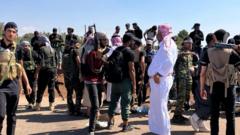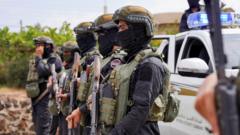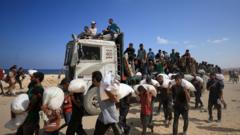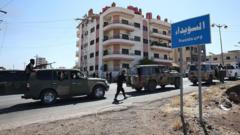**A fragile ceasefire in Syria's Suweida province has been established following a week of intense sectarian violence that left over 1,000 dead. However, concerns persist as both Druze and Bedouin factions prepare for the potential resumption of hostilities.**
**Fragile Truce Holds in Syria's Suweida Amid Sectarian Violence**

**Fragile Truce Holds in Syria's Suweida Amid Sectarian Violence**
**Tensions remain high following deadly clashes between Druze and Bedouin militias in the region, as ceasefire efforts continue.**
The uneasy peace in Syria's Suweida province seems to be holding, as international news agencies report on the aftermath of violent clashes between Druze fighters and Bedouin militias, which have resulted in a staggering death toll of more than 1,000 people. While a ceasefire has been established with the deployment of Syrian government troops, the situation remains extremely volatile.
On a recent attempt to reach the southern city of Suweida, a BBC team reported getting within six miles, the closest deemed safe due to ongoing threats from Druze snipers. The landscape reveals the remnants of battle: scorched businesses lay abandoned, and shell casings litter the streets.
The ceasefire, now four days old, is described as fragile, with heavy military presence in the area where groups of Syrian army soldiers can be seen resting with their weapons close by. As many local communities have been devastated in the conflict, the deployment of troops aims to quell further violence that has plagued the region.
As the BBC team traveled south, they encountered groups of armed Bedouin fighters who expressed their readiness to resume fighting if necessary. Their demands center around the release of injured Bedouin individuals they consider to be trapped within Suweida. One Bedouin leader emphasized, “If the Druze do not adhere to the ceasefire, we are prepared to take up arms once again.”
In addition to the chaos on the ground, reports have surfaced of abuses, with Druze factions alleging that government forces aligned with Bedouin groups have committed summary executions. Despite the ceasefire currently holding, tensions persist as both sides remain on high alert.
Medical conditions in the area are dire, as noted by Riham Bermawi of the Syrian Red Crescent, who described the healthcare situation as “catastrophic,” with shortages of essential medical supplies exacerbating the plight of the wounded. Efforts to evacuate more of the injured are complicated by the dangers posed by snipers targeting ambulances.
The recent violence in Suweida represents one of the most severe instances of sectarian conflict since the uprising in Syria began. Amid uncertain futures, local leaders, like Raed al-Saleh, continue to call for unity and peaceful solutions in an effort to reconstruct a society ravaged by years of war and strife. The path forward, however, appears fraught with challenges as communities grapple with trauma and loss while some still cling to hopes for reconciliation.
On a recent attempt to reach the southern city of Suweida, a BBC team reported getting within six miles, the closest deemed safe due to ongoing threats from Druze snipers. The landscape reveals the remnants of battle: scorched businesses lay abandoned, and shell casings litter the streets.
The ceasefire, now four days old, is described as fragile, with heavy military presence in the area where groups of Syrian army soldiers can be seen resting with their weapons close by. As many local communities have been devastated in the conflict, the deployment of troops aims to quell further violence that has plagued the region.
As the BBC team traveled south, they encountered groups of armed Bedouin fighters who expressed their readiness to resume fighting if necessary. Their demands center around the release of injured Bedouin individuals they consider to be trapped within Suweida. One Bedouin leader emphasized, “If the Druze do not adhere to the ceasefire, we are prepared to take up arms once again.”
In addition to the chaos on the ground, reports have surfaced of abuses, with Druze factions alleging that government forces aligned with Bedouin groups have committed summary executions. Despite the ceasefire currently holding, tensions persist as both sides remain on high alert.
Medical conditions in the area are dire, as noted by Riham Bermawi of the Syrian Red Crescent, who described the healthcare situation as “catastrophic,” with shortages of essential medical supplies exacerbating the plight of the wounded. Efforts to evacuate more of the injured are complicated by the dangers posed by snipers targeting ambulances.
The recent violence in Suweida represents one of the most severe instances of sectarian conflict since the uprising in Syria began. Amid uncertain futures, local leaders, like Raed al-Saleh, continue to call for unity and peaceful solutions in an effort to reconstruct a society ravaged by years of war and strife. The path forward, however, appears fraught with challenges as communities grapple with trauma and loss while some still cling to hopes for reconciliation.




















